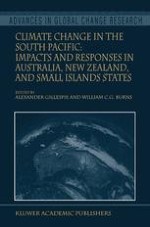2000 | OriginalPaper | Buchkapitel
The Formation of Australian Climate Change Policy: 1985–1995
verfasst von : Harriet Bulkeley
Erschienen in: Climate Change in the South Pacific: Impacts and Responses in Australia, New Zealand, and Small Island States
Verlag: Springer Netherlands
Enthalten in: Professional Book Archive
Aktivieren Sie unsere intelligente Suche, um passende Fachinhalte oder Patente zu finden.
Wählen Sie Textabschnitte aus um mit Künstlicher Intelligenz passenden Patente zu finden. powered by
Markieren Sie Textabschnitte, um KI-gestützt weitere passende Inhalte zu finden. powered by
Australia has proved to be something of an unknown quantity in the international climate change policy process. Having adopted a pro-active stand at Rio in 1992 during the Conference of the Parties process, it subsequently displayed an unwillingness to accept legally binding targets and timetables and advocated the merits of a ‘differentiated’ approach. The concept of differentiation is grounded in the belief that each nation-state should bear commensurate losses of economic welfare in the pursuit of greenhouse gas emission reduction goals. Although Australia has been criticised internationally for this approach,1 it formed the basis of the agreement reached at the Kyoto Conference of the Parties in December 1997. This chapter undertakes an historical overview of the policy responses of the Federal government in Australia from 1985 – 1995 in order to shed some light upon this position. It will be argued that while grounded in the policy discourse of ecological modernisation, Australia’s policy approach has failed to overcome some of the significant contradictions that this discourse tries to address. This analysis calls into question not only the potential for Australia to act on any outcomes achieved at Kyoto, but also the ability of the ‘ecological modernisation’ approach to resolve such contradictions.
